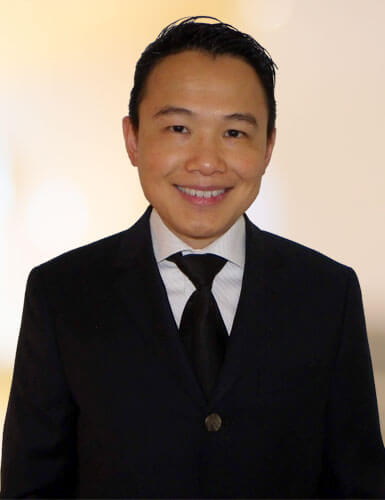Barrie dentist – alternatives to your dentures, or teeth that won’t fall out
Posted: December 28, 2013
Last Modified: December 21, 2020
Hate your dentures? Dentures not staying in? Looking for some options in Barrie? Read on, and find out what our dental office can provide for you. Implants and dentures can be a beautiful match.
First off, age is not a factor! We have heard some people say that they cannot get implants because they are “too old for them”. There is no magical age where implants cannot be done. What is more relevant is general health status (and by the way, osteoporosis by itself is not a limiting factor either). Below are some options to replace missing teeth, and some dentures that really don’t fall out.
Plain old regular dentures
Dentures are a time tested but old method of replacing missing teeth. They have been called “not a replacement for teeth, but a solution for no teeth”. This means that they can help a toothless person chew , but not chew as well as real teeth. (Dentures can be thought of as the K-car of replacement teeth – remember those pieces of trash?)
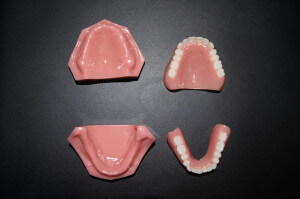
If your dentures are loose, it may be that there is a fit issue (particularly if they are old), but it is often a problem of the biting surface of the denture. The bite needs to be looked at just as carefully the bite on natural teeth. Often a simple adjustment can markedly improve the stability of dentures.
But, regardless of how good a denture is, it can be made better with the use of implants. Dental implants are titanium posts anchored to the bone, so instead of dentures rocking around on gum tissue, they can be much better secured to implants. Let us guide you through the options for dentures that involve implants.
1) Implant assisted dentures.
These are the bare minimum solution for implants and dentures. Four implants for the upper arch, or just two implants in the lower arch, and corresponding attachments on the inside of the dentures will make them far more secure. In fact, the upper denture can actually be made so that it does not cover the palate!
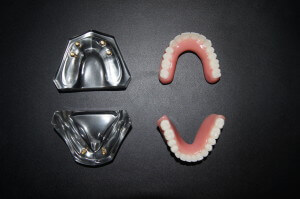
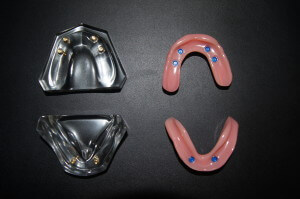
2) Implant assisted denture with a supporting bar
This is a much sturdier option than the basic implant denture mentioned above. Instead of a basic acrylic denture that mounts onto the implants, this denture is embedded with a metal housing on the underside. This housing clips onto a bar that is rigidly connected to four implants, and even has small pins that lie perpendicular to the arch. These pins lock the framework into the bar, so there is no accidental dislodgement. (See photos) The advantage of this system is that it allows a simpler surgery for the person placing the implants (the implants do not need to be as parallel as the above option, and may thereby reduce surgical costs), the denture is more easily repairable, and the biggest advantage may be the flexibility in tooth placement. When a connecting bar is used on implants, the dentist has much more freedom in designing your bite. This becomes important when there has been significant shrinkage of gums and bone over time.
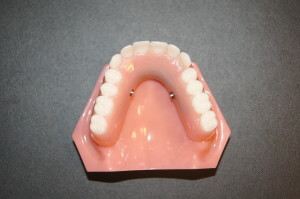
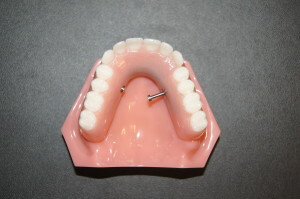
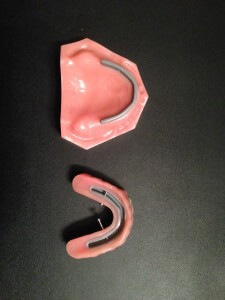
3) Implant supported bridges
With a minimum of four implants (but better with six) supporting a computer-milled titanium bar, an entire arch of teeth can be secured in the mouth and stay in – no removable parts! This is as lifelike as we can get it, and will give you the closest thing that dentistry has to recreating a lost set of natural teeth. There are variations on this theme, with options of a flange for lip support, acrylic or porcelain teeth (acrylic teeth wear down more quickly but are easier and less costly to repair) for example, but the idea is the same: a non-removable alternative to dentures.
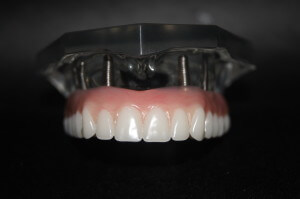
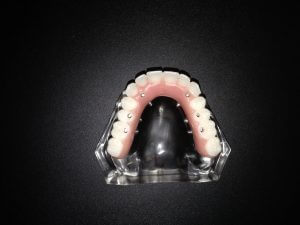
Dental implants are now the standard of care in many situations now, and the results are beautiful, stable, and long-lasting. In fact, once an implant has successfully integrated with the bone, we do not expect it to ever need replacement. Also, the confidence that the teeth will not accidentally come loose is indescribable. Chewing without embarrassment or discomfort, and knowing that the results will be durable, make implants one of the most life-changingly positive solutions available in dentistry.
We know there are many people out there who are unhappy with loose dentures, want dentures that do not cover the roof of the mouth, or just want teeth that do not come out.
If you are one of these people, contact us! We’d love to give you new teeth that look great and don’t fall out.

